Newsletter


Our Newsletter
Connections
Oct
5
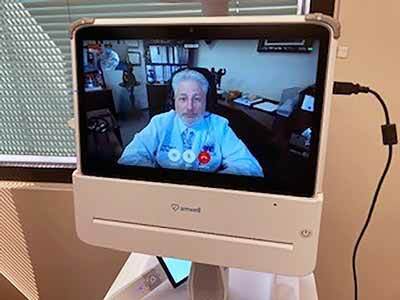
Los Angeles Jewish Home Receives Major Funding to Bring State-of-the-Art Technology to the Delivery of Care
The Jewish Home is a recognized leader in providing quality care to thousands of seniors across Los Angeles each year. This fall, the Home is once again blazing a trail, having secured not one, but two significant financial awards in the form of technology grants to increase seniors' access to the Home's vital programs and services.
In partnership with the California Emerging Technology Fund (CETF), a statewide nonprofit foundation working to close the digital divide in California, the Jewish Home received more than $860,000 from the Federal Communications Commission (FCC) for the groundbreaking COVID-19 Telehealth Program. Together, the two agencies are leading a collaboration that includes 12 other prominent California healthcare entities dedicated to advancing telehealth during the pandemic. The Jewish Home and other organizations in the group will use the award to purchase telehealth carts, Wi-Fi extenders, and tablets, helping to make telehealth services available to underserved and under-connected communities across the state.
"COVID-19 highlighted the healthcare inequality that exists in our country. This horrific virus disproportionately affected the poor, the undocumented, people of color, indigenous populations, and seniors. To limit the possibility of viral transmission, many clinicians and care facilities—including the Jewish Home— accelerated our use of telehealth, but too many people lacked the necessary resources to access it," says Noah Marco, MD, the Home's chief medical officer. "With this partnership, we are proud to be at the vanguard of efforts to reduce healthcare disparity and improve clinical outcomes for seniors and others."
Just 62 healthcare providers nationwide were awarded the coveted FCC funds, and the Jewish Home-CETF partnership was the only California group that was approved. It was also among the highest ranked applicants in the latest round.
In addition, the Home was recently honored with a prestigious Reimagine Grant from the Jewish Community Foundation of Los Angeles. The award—a portion of $3.7 million the foundation granted to 45 local Jewish nonprofits and synagogues—will also reinforce the Jewish Home's commitment to expanding telehealth's availability. Funds from the grant will allow the Home to hire a nurse informaticist/telehealth manager to lead the programmatic and clinical aspects of bringing telemedicine to our residents. This is a critical link in the successful provision of the Jewish Home's state-of-the art care.
"The Jewish Home has been caring for seniors for more than a century, and we remain a national leader by staying at the forefront of innovation," says Dale Surowtiz, the Home's chief executive officer and president. "We are deeply appreciative of the Jewish Community Foundation's generous grant, which will enable us to continue driving that innovation forward into the future."
Aug
30

Sharing Thoughts on This Year’s High Holidays
Following are thoughts from Skirball Director of Spiritual Life at the Los Angeles Jewish Home Rabbi Karen Bender who has been hard at work, along with Rabbi Ron Goldberg, creating another special High Holiday season here at the Home.
We know there are many family members and friends of Los Angeles Jewish Health who would like to join us for High Holy Days this year, and doing so would bring us all great joy. Unfortunately, due to ongoing public health regulations still in place, in response to the pandemic and especially since the onset of the Delta variant, we are regrettably unable to offer our normal and well known hospitality.
The good news is that at both Eisenberg and Grancell Villages, our communities will be able to safely gather in person for the celebration of Rosh Hashana and Yom Kippur this year! Residents will enjoy apples and honey, shofar and song. "Lo tov Adam lehiyot levado," proclaims the Torah, "It is not good for the human being to be alone" (Genesis 2:18). No one here will be alone. I pray and wish for everyone in the greater community to join us in having a sweet, good and meaningful new year.
Aug
30
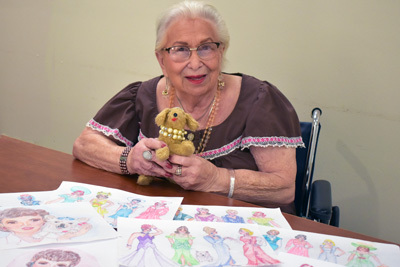
Fashion Designer Marilyne Holm Interview
As Fashion Week 2021 Arrives in New York, We Celebrate a Designer Who Spent Decades in the Fashion Industry and Who Is Still Inspiring and Setting Trends as a Resident of the Jewish Home.
Marilyne Holm, at 92 years of age, personifies the spirit of the Los Angeles Jewish Home. From the moment she greets you in the Taper facility on the Grancell Village campus, her warmth and smile make you feel like you've known her for years.
Born Marilyne Levy, she grew up with her parents and one brother in Sheboygan, Wisconsin. Marilyne describes it as "not necessarily a great place at the time for a Jewish kid to grow up."
Marilyne was one of only four Jewish students at her high school. Her love for sketching started well before her high school years. She actually recalls sketching at the age of three, though throughout her childhood, she was only able to indulge her passion once she had accomplished her many chores.
She married young, to a florist. Soon, she was pregnant with their son Christopher. As a child, Christopher asked his mother why she chose "Christopher" for a Jewish boy's name. She explained what a beautiful name she thought it was when hearing the childhood classic, Winnie-the-Pooh (Pooh's childhood best friend is the loving boy Christopher Robin). When it came time for Christopher to pick his own name at his Bar Mitzvah, he selected the more traditional "Baruch."
Christopher's parents eventually divorced, making Marilyne a single mom working full time, but she always made time for him, even volunteering for his Cub Scout troop.
She never remarried. However, when asked if she ever fell in love again, she gets a twinkle in her eye, and without missing a beat says, "Several times … but when you are a mother, that is the most important thing." She was protective of her son and the potential impact a new man might have on him.
Throughout all of life's changes, Marilyne's love of sketching never wavered. She studied at an art school in Chicago while also working at upscale department stores such as Marshall Fields and JW Robinson. It was in art school that she experienced discrimination: One teacher told her she really didn't need to study or do well, since Jews were taking over the fashion industry. At the time, she didn't know much about fashion, but the remark pushed her to do her best, and she ended up winning the major class competition.
All of her time working in department stores furthered Marilyne's knowledge of what clothes look best on a woman. Though she'd come to Los Angeles to be closer to the West Coast garment industry, this single mom still needed to break into the design field. She dove right in, hitting the pavement and going from place to place in the fashion district trying to get into the business. Eventually, someone gave her a chance.
From there the creative juices continued to flow. At one job, Marilyne and her colleagues noticed they kept making matching shirts and skirts. Suddenly, it occurred to them: Why didn't they just put a shirt and a skirt together in one garment to make a shirtdress? From then on, they were at the forefront of this very popular fashion style that is still widely embraced today.
Another day, proving good can come from adversity; she accidently burnt the bottom of a sleeve. Not wanting to waste the fabric, she rolled it up. Her boss loved the look so much; they successfully sold them that way from that point on.
Today, Marilyne can look back on two and a half enjoyable years at the Jewish Home. Before taking up residence here, she lived in L.A.'s Miracle Mile area.
When describing her arrival at the Jewish Home, she admits that, at first, she was a bit unsure. Then, she started touring the campus and realized how beautiful the grounds are. Once she had a meal, she said, "Well, this is good!"
The benefits kept on coming. After hearing there was a beauty shop right here on the campus, she asked, "Well, do they do back combs? Because that's how I have my hair styled." The answer was "yes"—and when she heard the low price, she was amazed.
Soon after, Marilyne saw the activities room, with its reams and reams of cloth, and she knew she had found her place. Today, she has become very well-known at the Jewish Home for a different kind of design: the sewing of adorable little stuffed dogs that bring joy to all who see them. The dogs are special. Boy dogs don a yarmulke, and female dogs wear babushkas. Marilyne's special stuffed dog, named Mendel, sports a beautiful pearl bracelet as a collar. She jokes Mendel "stole" it from her. By her estimate, she has made hundreds of the little friends since coming to the Home. One of her ongoing passions is teaching others to make them, and she points out that the activity is great for the mind and for maintaining dexterity.
When asked how she has managed to remain so upbeat, particularly during this past challenging year, Marilyne shares that it has been difficult—but that she just gets up each day, puts her make-up on, and makes a point to say "Hi" and "How are you?" to others. She doesn't mind if they don't answer, as long as she's doing her part to try to make them happy.
Reflecting on her time at the Jewish Home, Marilyne says it's easy to encapsulate how she feels. "This place is God's blessing," she enthuses. "It makes you feel good."
Aug
18
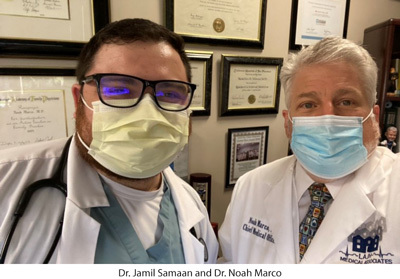
Cedars-Sinai Medical Center and the Los Angeles Jewish Home Team Up on New Residency Program
A prescription for physician success when caring for seniors
Early in their careers, physicians receive training in a broad range of disciplines, from orthopedics and obstetrics to cardiac care, pulmonary medicine, and more. Yet, very few new physicians get hands-on experience learning to care for the special needs of seniors. A new collaboration between the Los Angeles Jewish Home and Cedars-Sinai seeks to change that, bringing seniors and medical residents together to reshape the future of leading-edge senior care.
On July 1, the Jewish Home became an affiliate institution for Internal Medicine residents at Cedars-Sinai. The partnership allows physicians in their third year of residency to spend one week rotating through a number of programs at the Jewish Home, with a particular focus on the Home's skilled nursing facilities, Brandman Centers for Senior Care, hospice, and psychiatric care.
All 26 of Cedars-Sinai's third-year internal medicine residents are scheduled to participate (one at a time), mentored by Jewish Home medical leadership as the residents hone their skills caring for the Home's diverse senior population.
"Young physicians have little, if any, experience learning about the care of patients in nursing homes, yet as doctors in a hospital they often transfer patients to these facilities," says Noah Marco, MD, the Jewish Home's chief medical officer. "This is a critical opportunity for them to find out about what makes a good transition from hospital to nursing home, and what happens when their patients arrive at their next destination."
As Dr. Marco points out, the program is also a boon for Jewish Home residents. "One of the greatest challenges we have as caregivers of the elderly is continuously finding new ways to give them a sense of purpose and to engage them mentally and physically," he says. "Our residents truly appreciate being able to advance the education of young physicians, sharing their wisdom and lived experience. For the medical residents, it's a privilege to interact with and learn from our seniors. It's really a wonderful thing for everyone."
The residents are licensed physicians in the state of California and meet all infection control standards, including required vaccinations. While at the Jewish Home, they will deepen their knowledge of the Home's systems-based practice, develop a strong understanding of the deep responsibilities and benefits of the care they prescribe, and gain experience coordinating care as a member of an interdisciplinary team. However, they will not write prescriptions or orders for Jewish Home residents, and they will be supervised by the Home's medical staff at all times.
"We are delighted to have teamed up with Cedars-Sinai Medical Center to launch this initiative, which will help usher in a new era in medical education and, ultimately, improve the care seniors receive across our community or wherever these talented physicians may practice in the future," says Dale Surowitz, chief executive officer and president of the Jewish Home. "The Jewish Home and Cedars-Sinai both have long and distinguished histories in Los Angeles, and together we can reach new heights of success in supporting the seniors who rely on us for their care each and every day."
Cedars-Sinai leadership is grateful to the Jewish Home for providing Cedars-Sinai residents with such a tremendous opportunity to deepen their education.
"The internal medicine residency is thrilled to be partnering with the Los Angeles Jewish Home to enhance the educational experience of our residents around providing compassionate, holistic care for older patients," said Amanda Ewing, MD, FACP, director, Internal Medicine Residency Training Program at Cedars-Sinai. "It is a privilege to have our residents be able to learn from the practitioners who are the experts in caring for our seniors."
Aug
4
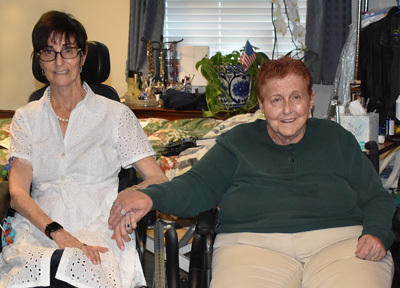
Friendship at First Sight
Helen Starlight and Ellen Meli knew they were beginning a wonderful, caring friendship almost immediately. Ellen recounts the day, just a few months ago, when Helen accidently bumped into her. Ellen says she was almost knocked over, but the sincerity and warmth in Helen’s apology, in just a few soft-spoken words, said it all. Shortly after, they requested to become roommates and they truly feel blessed to call one another roommate and friend.
They share a number of things in common. First and foremost, each woman is a proud mother and grandmother. They are also both women who worked outside of the home for many years, helping to support their families. Helen, who speaks English, Spanish and Hebrew, was an office manager for her husband’s dental practice. Ellen was owner and publisher of Welcome Homeowner magazine and a successful business consultant.
Now they reside in the Joyce Eisenberg-Keefer Medical Center, a skilled nursing facility on the campus of the Los Angeles Jewish Home. While each previously lived in various locations at the Jewish Home to meet their evolving care needs, and they roomed with other individuals along the way, both agree this meeting, at this time, was meant to be.
They have only been roommates for a few months; however, as they sit side-by-side, they already complete each other’s sentences like a couple who has been married for years. At the same time, when they describe one another, it’s more like newlyweds, each beaming when listing off the attributes that make their relationship special. Words like "understanding," "patient," "caring," and "loving" are used several times during the conversation—and throughout most of their interview, they are holding hands.
At 65, Helen is the younger of the roommates. Daily, she faces the challenges of ALS (amyotrophic lateral sclerosis). ALS is a progressive neurodegenerative disease that today has no known cure. However, when she describes her condition, it is with amazing strength, grace, and determination. She remains upbeat, saying, "Well, maybe they’ll find a cure. There were other diseases without a cure, and they found cures for those."
Ellen, 75, echoes that sentiment and describes with great satisfaction her role in helping with Helen’s care. She says that toward the end of some days Helen has trouble speaking without slurring her words a bit, but Ellen is right there making sure others understand and are meeting her needs. Ellen notes that this is a difficult situation for Helen and that, sometimes, she gets sad and emotional about her illness—as any of us would. When that happens, Ellen is there to listen, and to wipe away her tears.
Another commonality Helen and Ellen share is a deep affection for Skirball Director of Spiritual Life Rabbi Karen Bender, who visits them often. They beam as they recall recent visits including one where Ellen says the Rabbi shared that, if she were back in college, she would want to be roommates with the two of them.
When prompted, the women offer sound advice to other roommates, whether at the Jewish Home or in other communities: "Share everything with a mentality of what’s mine is yours, and vice versa," Ellen says. "When it comes to friendship, care about each other’s feelings. Take a few weeks to get to know each other. Give one another space and treat each other with mutual respect."
Without needing to add a word, Helen nods in agreement. They look at each other, and their warm and enthusiastic smiles set an inspiring example for roommates, friends, couples, and co-workers everywhere.
Jul
6
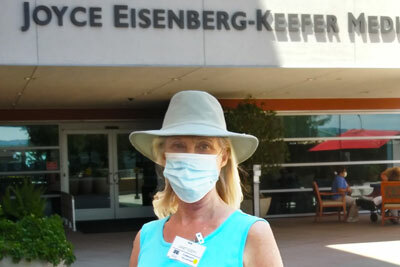
Volunteers Shine Bright at the Los Angeles Jewish Home
When it comes to offering high-quality senior care, the Los Angeles Jewish Home has a proven recipe for success. One of the central ingredients: our community of extraordinary volunteers, the people who selflessly give their time and energy to make this a place anyone would want to call home.
Volunteers come to the Jewish Home with a broad range of interests and experiences. Yet, all of them share a passion for making life a little sweeter for the seniors we are privileged to serve.
Longtime Tarzana resident Janet Edery had the Jewish Home on her radar for decades. She raised two kids as a single mom, and her son volunteered at the Home during high school. Today, at 71, she is now a volunteer herself, and says the care being offered is as exceptional as ever.
"My mom moved into the Jewish Home in 2014, and I would go every day to visit. It was immediately clear how amazing the environment is: stimulating, well-staffed, and with such delicious food! I knew she was in good hands," she says.
Later, after her mom passed away, Janet missed her daily interactions at the Home and decided to enroll as a volunteer. Until the start of the pandemic, she would spend one day each week bonding with skilled nursing residents—chatting, sharing a meal, and engaging in a wide range of activities.
"I would do tai chi with the residents or attend weekend concerts with them. I grew particularly fond of one resident, a woman from Argentina; we would go salsa dancing," she recalls. "The residents are always so happy, and being there would fill me with joy."
Once COVID-19 made on-site visits impossible, Janet's volunteer career at the Home was temporarily put on hold. But, with life reopening for people across Los Angeles, the Home is cautiously welcoming volunteers once again, while continuing to follow all of the latest health and safety regulations. This has allowed for Janet to resume supervising outdoor visits and reunions on Fridays.
"I'm thrilled to be back," she says. "The Jewish Home is special, and I want to become a resident myself when I'm ready!"
Whether they come from the community or from within one of the Jewish Home's own campuses, volunteers play a critical role in helping the Home run smoothly. Sandy Fine, a resident of Eisenberg Village, works in the Jewish Home's post office sorting mail. "I love what I do," she enthuses. "I know everybody's room number, and I learn their names. It's a wonderful way to meet people. The job is perfect for me!"
Sandy, 84, arrived at the Jewish Home two years ago. "I was living in my own house in North Hollywood, where I'd been for 40 years, when I had an accident. I went into rehab at the Home and ended up staying," she says.
For Sandy, her volunteer job is a way to remain physically and mentally active. "The post office helps keep my mind going, which is hugely important to me," she says. "I'm fortunate to be sharp, and I want to make sure I stay that way!"
As a resident volunteer, Sandy has an inside perspective on what makes the Home so unique. "Where else can you be with a bunch of people who all love the same things you do?" she asks. "We've got our own havurah [group of friends] here. There's just no other place like the Jewish Home."
Both Sandy and Janet enjoy their work, and they encourage new potential volunteers to join them. "We're a dedicated group, but there's a real need for even more of us," Janet says.To people who are interested, I'd say there's no time like the present!"
To learn more about volunteer opportunities, contact Stacy Orbach, director of volunteer services, at (818) 774-3219 or [email protected].
May
18
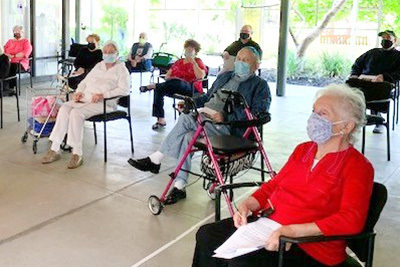
The Spirit of Shabbat Was in the Air
Friday, May 7th was a picture perfect Southern California afternoon. The courtyard at Grancell Village was sun drenched—yet, as it was midafternoon, there was plenty of shade for those who preferred it. A similar scene was unfolding at Eisenberg Village. Then it happened. After a year of public health regulations, so important to keep everyone safe, there was finally a green light to, carefully and cautiously, hold the first outdoor Shabbat services at the Jewish Home for 2021.
One by one, residents arrived, resolute in their commitment to celebrate the Shabbat in person and, with social distancing in place, among fellow residents.
Thankfully, services never stopped at the Home. Even at the height of the pandemic, thanks to extraordinary measures taken by our spiritual care and information technology departments, virtual services were provided each week. But now, the excitement and gratitude of the people on both campuses that services could once again be held outside and together was palpable.
Not only were residents delighted to be attending the service—there was pure joy in seeing one another. A staff member was stopped as she walked by, by a woman who requested she tug on the sleeve of another nearby resident to get her attention so that the two friends could safely reconnect prior to services starting. They told one another how great each looked.
As everyone settled in at Grancell Village, Skirball Director of Spiritual Life Rabbi Karen Bender asked people to share what they were grateful for as they came out for the service. Person after person shared in clear, loud voices, they were grateful for the staff and the extraordinary care they received during this past year and the Jewish Home for being here to keep them safe. In addition, there were several who expressed special thanks to the Home's dedicated spiritual leaders.
Special prayer books were printed for the residents. You could watch the aides dutifully help the residents follow along, turning the pages for them as they joined in the prayers and songs led by the rabbis.
For those who could not attend in person, the service was livestreamed on the residents' televisions. For those who did attend in person at Grancell Village, they were treated to clear sound thanks to a generous donation for a new sound system from Jewish Home Board Chair Andrew Berman.
They say it takes a village, and on a recent beautiful Friday afternoon, many came together to observe Shabbat and the special village that is the Los Angeles Jewish Home.
May
18
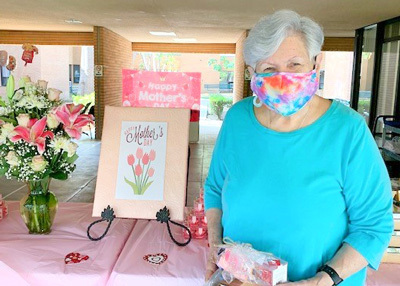
A Mother’s Day—and Month—to Remember at the Los Angeles Jewish Home
For more than two decades, the Los Angeles Jewish Home has hosted the annual World's Largest Mother's Day Celebration—a chance to honor our special mothers, grandmothers, and great grandmothers with special meals, festive music, and fun activities. Although the pandemic continues to require many modifications to events such as this one, the Mother's Day spirit is still alive and well at the Jewish Home, as families and Jewish Home staff and volunteers find innovative ways to mark the special occasion, not just on Mother's Day, but throughout the month of May.
Under the direction of Mother's Day Celebration dynamic Chair Elizabeth Jacobs, the Home produced a tribute journal, featuring special ads and messages from residents' loved ones, distributed digitally to more than 15,000 people. Producing the journal was a big undertaking, but Elizabeth shared it was worth the hard work.
"The Los Angeles Jewish Home holds a special place in my heart since my mother lived at Eisenberg Village and received extraordinary care," she says. "It is so very important to cherish and pay tribute to the special mothers in each of our lives. I was delighted to serve as chair of this year's celebration and to honor all of the beautiful women at the Home."
This year's Mother's Day festivities at the Jewish Home will take place throughout the month of May during what the Home is calling "Mother's Day Month." Plans for the celebration include special meals, as well as various fun, safely distanced activities. In addition, on Mother's Day itself the Home distributed sweet gifts to show appreciation to all of the moms.
These outpourings of affection have been made possible, in part, by generous Jewish Home donors and partners like Torrey Pines Bank, Presenting Title Sponsor of the Home's Mother's Day celebration.
"On behalf of Torrey Pines Bank, we wish all mothers a very Happy Mother's Day," said Monika Suarez, managing director of public, nonprofit, and affordable housing finance at Western Alliance Bank. "The bank is proud to sponsor the Home's Mother's Day celebration once again. We are pleased to be able to give back to the community and to celebrate the mothers living at the Home."
Families of Jewish Home residents, who have been accustomed to gathering at the Home for Mother's Day, have been supportive of this year's temporary shift away from in-person visits. "We know how hard it is on everyone unable to celebrate in person," says James Mackay, administrator of the Mark Taper building at the Jewish Home. "Public health regulations, space constraints, and the safety of our residents required us to come up with an alternative plan. We are tremendously grateful for everyone's patience and understanding, and we look forward to resuming our Mother's Day tradition next year. In the meantime, we anticipate safely accommodating more visitors as the regulations change in the coming weeks."
No matter what form the holiday takes, the Jewish Home remains dedicated to helping residents feel seen and loved, notes Dale Surowitz, the Home's CEO and president. "Mother's Day is always a very special occasion here. This year, we have so much hope for a bright future. As we cautiously return to more normal routines, we want to make certain we celebrate all mothers, today and every day," he says. "Happy Mother's Day to all those here at the Home and throughout our community."
May
4
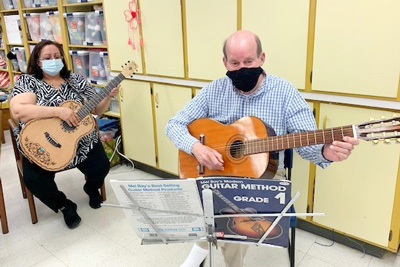
As Activities Resume, Life for Los Angeles Jewish Home Seniors Gets Back on Track
Throughout the pandemic, seniors at the Los Angeles Jewish Home kept busy with a broad range of engaging activities geared toward sparking engagement and joy during a challenging time. As we begin to turn the corner on the coronavirus, that list of activities is growing, the list of restrictions cautiously reducing, and residents are safely and slowly—but surely—preparing to enter a post-COVID-19 world.
Many of the new offerings still take place remotely, enabling residents to interact while maintaining social distance to safeguard against risk of transmission of the virus. An example of this is a series of writing classes conducted over the phone and led by Annette Weinberg, the Jewish Home's lifestyle and enrichment director for residential care at Eisenberg Village.
"We started with journal writing, which evolved into an eight-week course with an actual syllabus," Annette says. "The residents got so into it, and everyone did something to make it their own. We had someone keep a dream journal, someone else came up with the idea of a prayer/stream of consciousness journal, and yet another resident tracked her daily diet and exercise. One member of the class kept a legacy journal—something she planned to give to her grandchildren. No matter the topic, they were all creative and wonderful."
Annette followed this initial effort up with a six-week creative writing course, then rolled out a class focused on more general writing skills. "This latest class doesn't have any homework. We do writing exercises together, whether it's working on poetry, Mad Libs, or humor," she explains. "The first week, I gave everybody the start of a sentence and asked them to finish it off with something unexpected. We had a blast!"
In-person activities are also returning to the Jewish Home. "Sandy, our creative lifestyle and enrichment assistant, offers word games in person, as a small group activity (instead of on the phone, as it was offered these last months). And we now have a Spanish class and guitar lessons twice a week. Gloria, one of our talented lifestyle and enrichment employees, teaches both. So far, it's only a few people who are venturing out, but I think it's just the start of a return to normal, and we plan to increase our courses and activities over time," Annette says. "Stimulating our residents in this way helps keeps our brains firing on all cylinders."
Residents are delighted with the new offerings. Linda Schomberg is one of those enrolled in the Spanish class. "It's a lot of fun, and what's great is that people are at different levels, so we can learn from each other," she says. Jerry Cohen has loved having a chance to jam on the guitar, and he attributes much of his success to the high level of instruction. "Gloria is an excellent—and patient—teacher," he explains.
These classes take place in the Jewish Home's newly reopened arts and crafts room. According to Annette, having the opportunity to utilize the space once again has been a gamechanger. "It's been called ‘our happy place'—a spot where so many of our residents like to go and do their own, self-directed activities. For instance, we have a married couple who come in every day. He's a jewelry maker who creates beaded necklaces, and she knits. It's such a vibrant environment, and so thrilling after all these months of closure," she says. "Thank goodness!"
In addition to expanding activities and opening venues, the Jewish Home also continues to bring entertainment directly to residents in the comfort of their own rooms. One example: for her Bat Mitzvah project at Stephen Wise Temple, local student Barbara Cotliar plans to sing for the seniors of the Jewish Home, and Annette will broadcast her performance over the Home's closed-circuit TV station. Barbara says her goal is to "lighten people's moods. This has been a hard year, and I know one of the hardest things my grandparents had to go through over quarantine was not seeing their grandchildren. My hope is the residents of the Jewish Home will feel happy after watching my performance—singing always cheers people up!"
"Our residents love beautiful music like Barbara's, and we're so pleased to be able to share it with them," Annette says. "Whether it's through video content, activities on the phone, or in-person learning, we do our best to make sure residents can maximize their enjoyment every day."